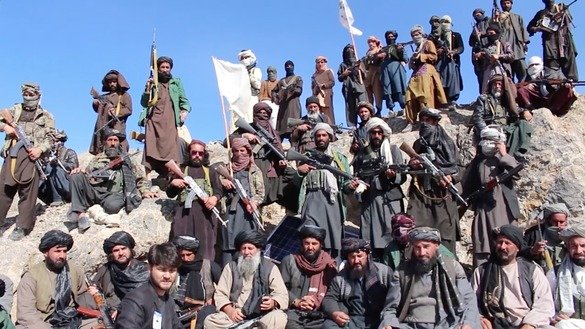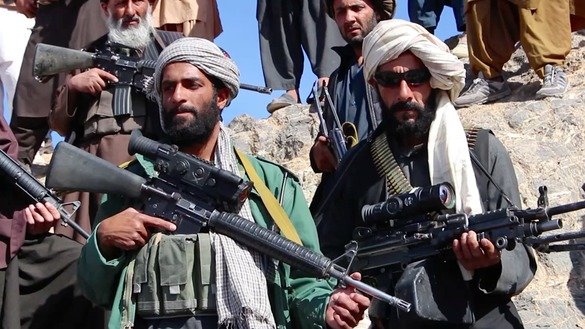KABUL -- A recent conference held in Moscow, ostensibly designed to formalise negotiations between the Afghan government and the Taliban, offered more evidence of splintering among Taliban factions and of Russia's meddling in Afghan affairs.
The stated purpose of the conference collapsed even before its starting date, Friday (November 9).
The Taliban, led by the group's chief, Mullah Haibatullah Akhundzada, sent five representatives to the Moscow meeting but insisted they would not hold any negotiations with the delegation from Kabul.
The Afghan delegation included four representatives of the High Peace Council (HPC), however the HPC did not represent the government at the meeting, emphasised the Afghan Foreign Ministry.
![Russian Foreign Minister Sergey Lavrov (left) addresses participants of international talks on Afghanistan in Moscow November 9. Lavrov said the summit aimed to create 'favourable conditions for the start of direct talks' between the Afghan government and the Taliban, but the Afghan government did not officially participate in the summit, and a Taliban spokesperson said, 'This conference was not about direct talks.' [Yuri KADOBNOV/AFP]](/cnmi_st/images/2018/11/13/15337-000_1ap2mb-585_329.jpg)
Russian Foreign Minister Sergey Lavrov (left) addresses participants of international talks on Afghanistan in Moscow November 9. Lavrov said the summit aimed to create 'favourable conditions for the start of direct talks' between the Afghan government and the Taliban, but the Afghan government did not officially participate in the summit, and a Taliban spokesperson said, 'This conference was not about direct talks.' [Yuri KADOBNOV/AFP]

A screenshot from a video shows Taliban fighters commanded by Mullah Manan Niazi in an undisclosed location in Herat Province on November 10. Mullah Niazi dismissed the recent Moscow summit as a 'bogus' attempt at peace.

A screenshot from a video shows Taliban fighters under Mullah Manan Niazi, deputy commander of a Taliban splinter group, in an undisclosed location in Herat Province November 10.
The US embassy in Moscow sent a representative to observe the discussions.
Taliban are 'Russian mercenaries'
A rival Taliban faction dismissed the motives behind and outcome of the summit, although the outcome remains unclear.
The meeting was just a sham to deceive Afghans, according to Mullah Manan Niazi, a deputy head of the so-called "High Council of Afghanistan Islamic Emirate," a Taliban splinter group.
"The Moscow summit is just as bogus as those fake peace negotiations held by the Afghan government in Kabul and Saudi Arabia," he said in a video message, referring to the two ulema meetings convened by the Afghan government in Kabul and Jeddah this year.
The "lies and fabrications" enabled by Moscow "serve only to deceive our poor, desperate people", he said.
Using Russian-made weapons, the Taliban kill Afghan security personnel and civilians daily, yet the Kremlin insists it cannot accept NATO in Afghanistan, noted Niazi.
"How do they want to bring peace?" he asked wryly in the video message about the Kremlin. "Russia even provided the night vision rifle scopes used by these Russian mercenaries [the Taliban under Haibatullah]."
"Russia targets the Afghan people, while Iran destroys the nation and kills the people of Afghanistan," he said.
"Russian mercenaries can no longer survive in Afghanistan," Niazi continued, adding, "Russians do not bring peace. They are, as always, acting against our national and Islamic customs."
"All the civilian casualties and misery of Afghanistan come from the infidel group of Haibatullah," he said. "These are all made possible with the financial and military assistance of the two oppressive and non-believer states of Russia and Iran."
"Neither Russia nor Iran can bring peace to Afghanistan," Niazi added.
Conflicting messages
As the talks opened, Russian Foreign Minister Sergey Lavrov said Moscow hopes "through joint efforts to open a new page in the history of Afghanistan."
The participation of both Kabul and the Taliban is an "important contribution" aimed at creating "favourable conditions for the start of direct talks", he said.
The Moscow summit, however, ended without any declared pathway to a direct dialogue between the warring parties, according to the Taliban and the HPC delegations.
"This conference was not about direct talks," Taliban delegation leader Sher Mohammad Abbas Stanekzai told journalists, according to Interfax.
The Taliban "does not recognise the current [Afghan] government as legal, and therefore, we won't hold talks with them," he said. "Because our main demand is the withdrawal of foreign forces, we will discuss a peaceful resolution with the Americans."
The US government has repeatedly stated that peace negotiations should be Afghan led and Afghan owned, with support by the US government.
Haji Din Mohammad, the head of the HPC delegation, told journalists that Russia invited his team to another meeting but that "agreement was not reached on holding direct talks" with the Taliban, RIA Novosti reported.
Afghanistan rejects Russian motives
The Moscow summit failed to produce an agreement because Russia pursued ulterior goals, officials and analysts argued.
"There were negotiations between Kabul and Moscow, but we did not reach an agreement," Afghan Foreign Ministry spokesman Sebghatullah Ahmadi told Salaam Times. "Unlike previous meetings ... in Moscow, which were diplomatic and included independent states, this time it invited only a certain group."
"Afghanistan's leadership and ownership of the peace process are among the key requirements ... to help Afghanistan achieve peace," Ahmadi said.
"The Afghan government has always emphasised that peace talks should be Afghan led and Afghan owned ... but Moscow rejected Kabul's request and led the meeting itself," said Nabi Mesdaq, a Kabul-based political analyst.
"As a result, all talks during the summit, as well as the Taliban's interview with Russian media after the summit, were all in favour of the Taliban and Russia," he told Salaam Times.
"Despite the will of the Afghan government and its people, Russia and the Taliban do not want the United States and the international community to be present in Afghanistan," Mesdaq said. "Accordingly, the closing message of this summit called for the withdrawal of the international community from Afghanistan."
Moscow's hidden agenda
Moscow's intention in holding the summit "was not to bring the Taliban to the negotiating table, nor was it for the purpose of discussing the peace-related topics", said Khalid Pashtun, a member of the Wolesi Jirga (Afghanistan's lower house of parliament) representing Kandahar Province.
"From what Taliban representative Abbas Stanekzai said, it was obvious they didn't come to Moscow for peace talks," he told Salaam Times. "His entire proposition was that the United States should withdraw from Afghanistan."
"Why didn't the Taliban make peace in 2014, when most US forces had left Afghanistan?" Pashtun asked, pointing to Taliban insincerity. "Instead, the Taliban ... stepped up combat at that time."
"All this shows that the [demand for the] withdrawal of US forces is only an excuse," he said. "The Taliban and the Russians have teamed up to incapacitate both the Afghan government and US forces."
"Russian-made weapons have been repeatedly found and seized by security forces in Farah, Helmand and other provinces," he said. "Intelligence indicates that the Taliban shadow governor in Helmand [Province] carries out orders from Moscow and Tehran."
"The Taliban and Russia clearly are ... co-ordinated in their hostile activities in Afghanistan," Pashtun added.
Afghans remain 'skeptical'
"Although the Russian foreign minister declared the summit an attempt to help end the war in Afghanistan, both the people and the government of Afghanistan are sceptical about the efforts of the Russians, given Moscow's financial and weapon support of the Taliban," said Abdul Muin Muin, a Kabul-based political analyst.
"Russia considers Afghanistan ... part of its sphere of influence," he told Salaam Times. "It is completely focused on bringing to power the groups that are under its influence, including the Taliban."
"Establishing relations with the Taliban, supporting them, and now giving them a platform ... at the Moscow summit prove that Russia and the Taliban are working in harmony in Afghanistan," he said.
"The Russians held a peace summit in Moscow to show the world their desire for peace in Afghanistan," said Zakaria Zakaria, a member of the Wolesi Jirga from Kabul. "Their support for the Taliban, however, is not for peace; rather, it is for war."
"The Taliban's participation in Moscow and their rejection of negotiations with the Afghan government show that the Taliban and Russia are not pursuing the peace process," he said. "Rather, they have formed a front against the Afghan government and its international allies."
"The Taliban, a group that considers itself an Islamic movement, did not participate in Islamic countries' peace conferences, which occurred in Indonesia and Saudi Arabia," Zakaria said.
"Their participation in Moscow shows that.. the Taliban exploit the name of Islam and, benefit from Russian support and are moving forward according to Russia's plans."
[Nasir Salehi from Herat contributed to this report.]







